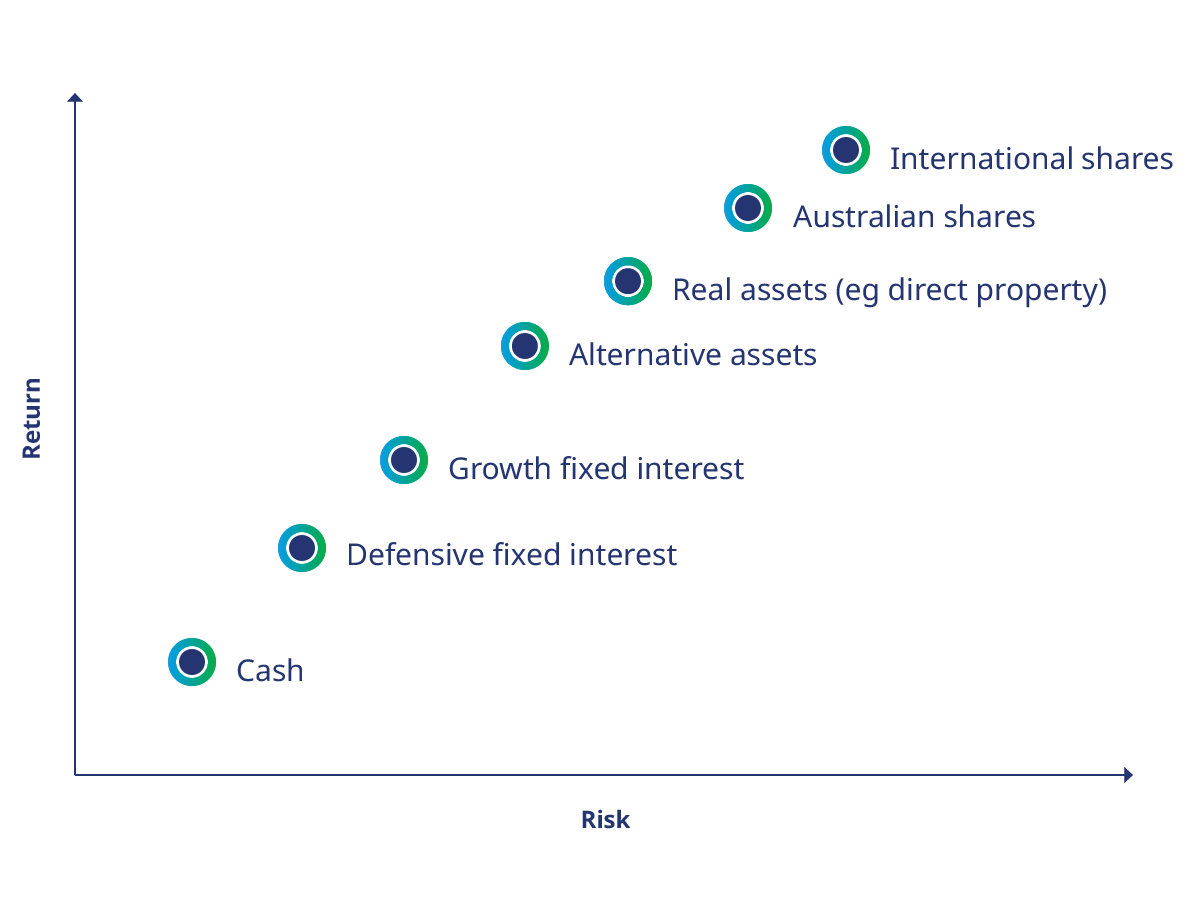Getting to know asset classes
An asset class is a group of investments that share common features, including their potential for returns and their associated risk of losses. All asset classes carry some risk.
Generally, assets with higher long-term growth potential are more likely to experience higher volatility – ups and downs in investment performance.

Asset classes and your super
Asset classes form the foundations of any investment portfolio – including Mercer Super investment options – so knowing what to expect from each asset class can help you make investment decisions that are right for you.
Mercer Super members can choose from a range of investment options which may include a mix of some, or all, of the asset classes outlined in this article.
- Shares – including Australian and International Shares
- Real assets – including unlisted property, infrastructure, and natural resources
- Fixed Interest – including defensive and growth fixed interest
- Cash – including term deposits and bank bills
- Alternative assets – such as private equity and hedge funds
Top tip: Diversification – spreading your investments across a range of different asset classes and different assets within each class – can help reduce the risk of large short-term losses.
Shares
When an investor buys shares (also known as securities, equities or stocks) they buy part-ownership of a company. Listed shares can be bought and sold on an exchange, such as the Australian Securities Exchange (ASX) or the New York Stock Exchange (NYSE).
Shares typically provide investment returns from two sources; company profits (paid to shareholders as dividend income) and from fluctuations in share prices.
A share portfolio can be diversified by investing in companies of different sizes and from different industries. International shares can be further diversified by investing in different countries or regions.
Australian shares are listed on the Australian Stock Exchange (ASX) and include companies like Woolworths, Telstra, CSL and the big four banks. Your Mercer Super investment option may also include a small exposure to companies listed outside the ASX
International shares are listed on foreign stock exchanges like the New York Stock Exchange or the NASDAQ. They could include companies like Microsoft, Amazon and Mastercard. They may also include stocks in companies from developed markets and emerging markets.
Top tip: Shares are normally included in a portfolio for their long-term growth potential. They can be volatile over the short term, so are generally considered a high-risk asset class.
Real assets: property, infrastructure and natural resources
Real assets are tangible resources like commercial property, infrastructure assets and natural resources. Real assets can be growth or defensive oriented and expected returns and associated risks can vary widely within the asset class.
Commercial property – such as offices, shops, warehouses, and distribution centres can provide returns from both rental income and from growth in the value of the asset itself over time.
Infrastructure – such as roads, railways, and airports are large assets that provide essential services. They can provide a steady stream of income and the long-term nature of most infrastructure assets means their returns are less volatile – so they contribute to a more defensive, diversified investment portfolio.
Natural resources – as the name suggests, these assets occur naturally and can be mined, farmed, or collected in raw form. The includes assets that are used as part of daily human life, such as water, iron ore, natural gas, agriculture, and lumber for example.
Top tip: Property investments are often included in a portfolio for their income generation potential.
Fixed interest
A fixed interest asset is effectively a loan to governments or businesses. A bond, for example, is a loan from an investor to a government or business – the issuer. The issuer promises to repay the loan at a certain point in the future, with interest payments along the way.
Fixed interest is regarded as a lower risk asset class and is usually included in a portfolio for relatively stable returns. Returns typically come from interest and changes to the market value of the bond. When interest rates rise, the value of a bond can fall. When interest rates decline, values can rise. Returns can also be impacted by the level of risk associated with the issuer.
There are different types of fixed interest assets which will have different return expectations and risks associated with them.
Defensive fixed interest investments generally provide a regular income stream with the repayment of capital expected at the end of the term. These investments are generally considered defensive as they are invested mostly with highly rated government bond issuers in developed markets or highly rated investment grade corporate issuers.
Growth fixed interest investments target a higher return by investing in issuers that carry higher levels of risk. Investments include non-investment grade corporate bond issuers, or government bond issuers in emerging markets.
Cash
Cash includes term-deposits with banks as well as money market securities issued or guaranteed by a government, bank or corporate entity. Typically, cash investments offer lower returns than growth assets, in the form of interest.
Cash investments can be considered safer options, but gains may be eroded by inflation – when high inflation reduces the buying power of cash faster than the interest being earned.
Top tip: Cash may be suited to those investing for a short time or those who want a very high level of security.
Alternative assets
Alternative investments include assets not found in the other four asset classes. They cover a range of investment types including private equity, venture capital, renewable energy, hedge funds, and private debt.
Alternatives offer greater diversity to a portfolio because their performance can be less linked to the performance of the other four asset classes. That means they have the potential to perform well when markets are struggling, and offset losses in other parts of the portfolio.
Top tip: Alternatives can be growth or defensive assets and are generally included in a portfolio to increase diversification.
Conclusion
Asset classes are the building blocks of any investment portfolio. The risk and expected returns associated with any given investment option is dependent on the asset classes that underpin it. Understanding asset classes is as essential part of making informed decisions about which investment options are right for you.
A little advice goes a long way
Make informed decisions about your investment strategy with e-Advice.
Read next:

Diversification and your super
Learn about investment diversification and how it helps grow and protect your super account balance.

Investment risk and your super
All investments carry some risk and offer some potential reward – in the form of positive returns. The challenge lies in balancing the two.

The ins and outs of additional personal super contributions
Your super is a long-term investment – additional contributions you make today can have a significant impact on your balance and retirement outcomes.
Disclaimer: This content has been prepared on behalf of Mercer Superannuation (Australia) Limited (‘Mercer Super’), ABN 79 004 717 533, Australian Financial Services Licence #235906, the trustee of the Mercer Super Trust ABN 19 905 422 981. Any advice contained in this document is of a general nature only, and does not take into account the objectives, financial situation or personal needs of any particular individual. Prior to acting on any information contained in this document, you need to consider the appropriateness of the advice taking into account your own objectives, financial situation and needs, consider the Product Disclosure Statement for any product you are considering, and seek professional advice from a licensed, or appropriately authorised financial adviser if you are unsure of what action to take. Past performance is not a reliable indicator of future performance. 'MERCER' is a registered trademark of Mercer (Australia) Pty Ltd ABN 32 005 315 917.
